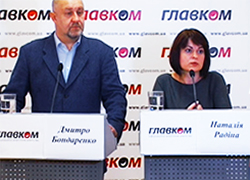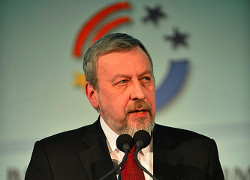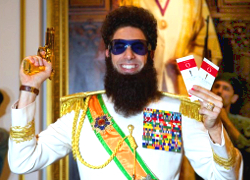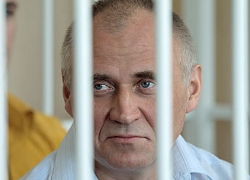November 7th, 2014

The Belarusians and Ukrainians are natural allies in the struggle against Putin and Lukashenka.
Coordinator of the civil campaign European Belarus Dmitri Bondarenko and editor-in-chief of charter97.org Natallia Radina visited Kyiv to take part in the press-conference held by the information agency Glavkom and moderated by head of its press-center Natalia Malinovskaya. According to Bondarenko and Radina, Belarusians and Ukrainians are natural allies in the fight against Putin and Lukashenka.
- How would you comment Lukashenka’s role in the Russian-Ukrainian conflict? We know that you are skeptical about Lukashenka’s contributions as a “peacemaker”. Have you changed your opinion after your arrival to Kyiv?
Natallia Radina: No, I haven’t. It would be a great mistake to expect something from Lukashenka, simply because Ukraine’s new government were elected in a democratic manner, while Lukashenka is a dictator. In the country where his dictator regime rules politicians are murdered, political prisoners are kept in jails, prisoners of consciousness are tortured. Dmitri Bondarenko here spent a year and a half in a Belarusian prison, he can tell you more about it.
It is weird that democratic Ukraine chooses allies like Lukashenka. Don’t forget, Lukashenka is Kremlin’s marionette. He lets Russia keep its troops and weapons in Belarus. He is a very dangerous and cunning neighbor, not an ally. In the situation when Russia and Ukraine are at war, he is looking for certain dividends for himself.
- Is it Lukashenka’s time to shine now when Europe is willing to cooperate with him?
Natallia Radina: A similar situation already happened in 2008 during the Russian-Georgian war when Lukashenka was selling his position on Southern Ossetia and Abkhazia to Russia and Europe at the same time. He didn’t recognize these territories as independent states, and in return he got loans from the EU which saved his dictator regime from a collapse. The economic situation in Belarus was catastrophic back then.
- Today Ukraine suffers attacks by Russia. Is it plausible that Lukashenka will change the way he treats dissidents if he realizes that he can be the next victim?
Dmitri Bondarenko: Unfortunately, this is an illusionary hope. The dictator will remain, while people who we hoped would become democratic leaders leave. One of the reasons behind this are the mistakes in foreign and home politics. I mean Lukashenka’s lobbyists Mikhail Saakashvili and Viktor Yuschenko.
Unfortunately, during the past 20 years we have been through that many times. New diplomats and foreign ministers arrive to Minsk. Nearly all of them naively hope to change Lukashenka, but you cannot change someone who is so determined to keep their power at any cost.
At the same time, Lukashenka’s regime exists at Moscow’s expense. The financial aid from Russia, such as low oil and gas prices, combined with debts that the regime will never pay back, amount to 5-10 billion dollars annually. While previously the Russian empire in the form of the USSR could support dozens of pseudo-communist regimes at once, today its resources are enough for only one “brotherly” dictatorship. Russia cannot do more, and Lukashenka takes advantage of this situation.
- Given that Lukashenka will never change, can there be a Belarusian Maidan?
Natallia Radina: There will certainly be a Belarusian Maidan. Ukraine’s example has showed that regimes like Lukashenka’s or Yanukovich’s leave no other option of power transmission. The question is when the Belarusian Maidan will happen. But it is obvious that even Belarus will see an escalation.
However, there is one problem: the Belarusians are fooled by the Russian propaganda. Russian TV-channels are broadcast all over Belarus. During two decades, Lukashenka has been destroying independent media, and today we suffer the results of his politics. Basically, today the Belarusians trust Russian media more than the Belarusian propaganda and consider Putin to be a lesser evil than Lukashenka.
- This is actually very sad…
Natallia Radina: I would not put it this way. Masks are off. The way Putin’s regime treats Ukraine demonstrates their imperial nature and ambitions. There is hope that Europe will finally wake up and realize how dangerous the situation in our region has become and how close the world is to getting a new USSR, or even worse – a new Russian Empire. Putin supports the marionette regimes of Belarus, Southern Ossetia, Abkhazia and Transnistria and is trying to install a similar regime in Ukraine.
- I am not convinced that Europe will ever wake up. Half of the countries there have been bought, some are too engaged in their games, and some simply don’t care because they are only minor players on the global stage.
Natallia Radina: But let’s not forget about oil prices, a crucial factor.
- Let’s hope so. I often say that the Ukrainian events show the entire world how not to do. We are trying to build a new Ukraine, which is why I would like to hear a third opinion about the mistakes that we have already made when building the new country?
Dmitri Bondarenko: As the majority of normal people around the world, we admire Ukraine, your people’s courage and will that you have showed at the Maidan and in the struggle against the direct aggression of Russia.
During the collapse of the USSR it was clear that communism is bad, and that we need to help the countries that want to get rid of this ideology. Today, Ukraine is a lone fighter, which, too, can be seen as a mistake. Charter97.org and other independent Belarusian media built an incredibly strong interest for Ukraine. Hundreds of our activists were at the Maidan during the “orange” revolution and at the Euromaidan in 2013-2014.
What has each Maidan given us? Ukraine’s new leader hugging with our dictator, something that would never happen in the times of the Polish Solidarnosc. Poland transmitted the light of freedom on other countries, and new Polish leaders worked with dissidents from Czechoslovakia, Hungary and Eastern Germany. Poland showed a strong political example.
What do we see in Ukraine? We see Maidan leaders hugging with dictators and having business relations with dictators. Real-politik in action. Yushchenko’s friends were Kaddafi and Lukashenka. With such actions, your powers trigger periods of depression in Belarus.
During the Maidan, official Belarusian media poured loads of dirt on the Ukrainians who rebelled against the dictatorship while the democratic powers took the Maidan’s part. However, when Ukrainian leaders come to power, they tend to forget about Belarusian democrats and bow to Lukashenka. Why isn’t any of them speaking about our political prisoners? Why does the country that has signed the Association Agreement with the European Union lets an EU-blacklisted person across its border?
This is the mistake. Ukraine cannot win alone, even with all its might and tragedy. Our countries have been together for thousands of years. Together we were suppressed by the empire, together we should free ourselves. Only a free democratic European Belarus can be a friend of free democratic Ukraine.
Should we bet on the dictator? This is a test for us. Where is Saakashvili? Where is Yushchenko? They say that Poroshenko has to put out the fire. His predecessors, too, had to “put out the fire”, but a quick look at the recent statistics shows that tobacco supplies from Belarus to Ukraine grew 40 times. Can there be a connection to your open borders with the EU? Supplies of alcohol grew 8 times.
We are not trying to criticize your home politics, the purpose of our visit to Kyiv is to check what we can learn from the Ukrainians. Moreover, we want to remind that the control over the power should include both home and foreign affairs, because a cooperation with dictators affects the free Ukraine’s image.
- The negotiations in Minsk will continue, won’t they? It will take months until the conflict in the East is settled. It is impossible to cut off all diplomatic contacts between independent Ukraine and the dictator.
Dmitri Bondarenko: there is one simple thing. When Poland’s foreign minister Radoslaw Sikorski or German foreign minister Guido Westerwelle came to Belarus, they met with representatives from the authorities and the opposition. When the leaders of the new government (and previously - the leaders of the “orange” government) visit Minsk, they never meet with Belarusian democrats and families of the political prisoners. It causes huge reputational damage.
It is true that now in the wartime Minsk offers a platform for negotiations; however, European democratic politics should follow certain standards.
Natallia Radina: Speaking about Minsk as a platform for negotiations, we can clearly see that all agreements are simply disregarded. I have heard different points of view, some meaning that Belarus was the only place to meet because the separatists cannot travel to Geneva and Kazakhstan’s government refused to act as an intermediary.
However, who is it that Kuchma is negotiating with in Minsk? Putin’s puppets? This is completely meaningless. Putin is determined to continue his aggressive politics. For him, the negotiations in Minsk are a little break before the next attack.
- Who benefits most from the negotiations in Minsk?
Natallia Radina: Definitely Lukashenka. This person has always been an international scapegoat. Previously he used the Russian-Georgian war and now he is using the Russian-Ukrainian war to pop up to the global arena as a jack-in-the-box. Lukashenka has deeply rooted psychological complexes. For him, it is crucial to be a politician of a global level. And he exploits your tragedy to 100%.
Trust me, he doesn’t give a damn about Ukraine or the Ukrainian people. Just look at what he is doing: every public statement that comes from Lukashenka is full of contradictions. In one sentence, he praises Ukraine; in another, he gives compliments to Russia. This deep split makes him a political puppet led by the Kremlin puppeteers. Trust me, he will betray Ukraine whenever it is in his interests.
Moreover, Lukashenka has made Belarus a transit and smuggling zone that European goods cross on their way to Russia avoiding sanctions. In fact, he earns tons of money that land in his pocket. For Lukashenka, it is crucial to have the status of a “negotiator” and “peacemaker”, although in reality he is a businessman who earns money on the Ukrainian blood.
- Indeed, the image of ”dictator-peacemaker” is something new. The world hasn’t seen it before… Soon it’s time for elections in Ukraine. What is your evaluation of our electoral campaign?
Dmitry Bondarenko: despite all the problems and the ongoing war, Ukraine is transforming into a democratic state. We envy you. In Belarus, independent media disappeared for a long time ago. The majority of Belarusians hate Lukashenka and are tired from this life, but without media, the communication is one-way.
Meanwhile, the Ukrainian society is alive. We see your electoral campaign in the streets and in the media. Of course, different media can have different angles and different stakeholders, but this is democracy. We want to wish you luck. The situation in Belarus is different.
I hope that the new Supreme Rada will be better than the present because your powers will change completely. This is crucial for Ukraine, both nationally and internationally. The country will have a legitimate president and a legitimate parliament. You have civil control over the powers. This is a huge step forward. Ukraine is a regional power with a huge potential. I would like to see your spirit of freedom spreading to Belarus and other countries.
Natallia Radina: I hope that Ukraine’s new parliament will be more selective in its contacts than the previous Supreme Rada, and that they will not begin with establishing a relation with the illegitimate Belarusian parliament. Don’t forget that there are no legally elected deputies or parliament in Belarus. Lukashenka has destroyed and subordinated all power institutions in the country. The Belarusian “national gathering” is a puppet structure. In other words, my message to the new Ukrainian deputies is to establish contacts with the democratic Belarus, not with the dictatorship.





